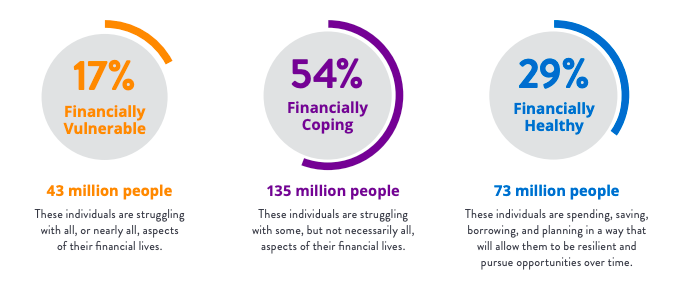Have you been affected by the coronavirus financial impact? Chances are, in one way or another—you have.
The last recession was hard for Americans but we’re seeing the coronavirus have an even bigger impact on US households. Who thought that a virus 1,000 times smaller than a grain of sand would have triggered it?
Our hearts go out to all the individuals and families that are suffering right now. The great news is you don’t have to live in fear! We’re all in this together and things will get better.
Why Is The Coronavirus Financial Impact Such a Big Deal?
When you think about the number of individuals and families this is impacting, it’s going to take some time to get back to “normal”.
Husbands and wives losing their jobs, recent college grads not being able to find employment, and many small businesses shutting their doors for good.
How Is It Different This Time?
The truth is things aren’t much different than the past. We have always seen ups and downs in the economy. When things are good, you get comfortable and spend more freely. When things are bad, you become fearful and buy up all the toilet paper. This behavior cycle will repeat itself in the future.
The best thing we can do is prepare ourselves to weather any storm that will come our way.
Based on the US Financial Health Report of 2019 we can see all the areas Americans were struggling financially leading up to this crisis before the coronavirus financial impact.
US Household Struggles Before COVID-19
Ten years after the end of the Great Recession, millions of Americans are still struggling financially. Even as the economy continues to grow and unemployment has reached a 50-year low, millions of Americans do not have the day-to-day financial systems they need to be resilient and thrive.
Source: US 2019 Financial Health Pulse
According to the 2019 Financial Health report, opposite to what you would think, when times are good “people are setting aside less money in short-term savings and are less confident that their insurance coverage is sufficient, making them more vulnerable in the event of a recession.”
Here are some statistics to back this up:
Savings Rate
The national savings rate has steadily declined since the 1960’s and before the 2008 financial crisis, the savings rate was at an all-time low at about 2%. After the financial crisis of 2008, the savings rate increased, and before the Coronavirus hit we were back down to 2%.
Cash Flow Management
Americans have always struggled with cash flow management. When money is mismanaged, you are more likely to save less, pay higher interest in debt, and are less likely to reach your financial goals.
Meeting Ongoing Bills
71% of Americans were financially vulnerable or financially coping before the coronavirus pandemic. Now that we’ve seen the impact this pandemic has caused, nearly all Americans are having difficulty meeting their ongoing bills.
Emergency Funds or Lack Thereof
Nearly half of Americans would have a difficult time coming up with $400 for an unexpected emergency expense. It’s not easy for you to set aside money for emergencies because emergencies are all around you. For example, forgetting to buy a dress for your friend’s wedding isn’t a real emergency but you may be tempted to think so.
What we have isn’t a savings or a spending problem, but a financial behavior problem. For things to change, behavior has to change at a deeper level.
Times like these can often be a good thing because it causes you to take a step back and focus on the important things in life. You may have become financially disorganized and now it’s time to put things in order. Not only with your personal finances, but also your relationships and health.
Back to the Basics: 3 Things to Start Doing
1. Live Within a Budget
You’ve heard it before, but having a solid budget will do more for you than almost anything. Understanding must-haves, should-haves and could-haves will help you know where to cut back. Your biggest priorities should be housing, food and water, and clothing.
Related: Budgeting 101: How to Create a Good Budget
In hard times, other things can be taken out of the budget and you can focus on spending quality time with loved ones (which doesn’t cost a dime).
In the past, sticking to a budget has been tough. Qube Money makes it easy to give each dollar a job and make a conscious choice before you spend. The technology then automatically tracks every purchase so you don’t have to. Budgeting made easy.
2. Avoid Debt
Try to stay within spending limits and avoid impulse purchases. Not only will this help you be more confident in your current financial situation but it will help you in the future. If you have debt, right now may not be the time to go all-in on paying it off, but you can avoid going even further into debt.
Related: How to Eliminate Debt Without Changing Your Lifestyle
Qube Money has plans to release an automated debt-elimination program that will pay down, track, and eliminate your debt automatically.
3. Build Up an Emergency Fund (If Possible)
Don’t simply create an emergency fund to have an emergency fund. Do it with the intent of covering living expenses for times like these. Avoid pulling the money out of your savings by keeping it in an account that is separate from your primary bank.
Use your stimulus paycheck to cover the necessities and put any extra toward your emergency fund
Shortly after Qube Money launches, the round-up option will make it easy to round up each purchase to build an emergency fund, save for dreams, live within a budget, and avoid debt.
When Will Things Get Better?
The impact on US households has been difficult. And our situation may continue to worsen. No one knows when things will start to get better. But we do know without a shadow of a doubt that things will get better. They always do.
“As sure as the spring will follow the winter, prosperity and economic growth will follow a recession.” – Bo Bennett
Conclusion
Few people expected the coronavirus financial impact to hit US households and businesses so hard. As hard as it is to believe, things will get better.
This pandemic is forcing us to return to the basics. Things like washing hands, drinking water and eating healthy. It’s time to focus on the financial basics again. Living within a budget, avoiding debt and building up an emergency fund are all basic things you can start doing today to help you get through this.









